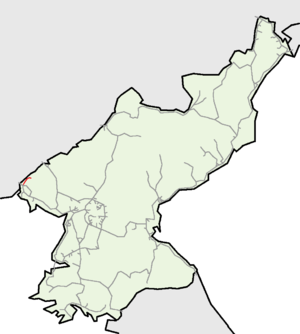Tokhyon Line
| Tŏkhyŏn Line | |||
|---|---|---|---|
| Overview | |||
| Native name | 덕현선(徳峴線) | ||
| Status | Operational | ||
| Owner | Korean State Railway | ||
| Locale | North P'yŏngan | ||
| Termini | |||
| Stations | 6 | ||
| Service | |||
| Type | Heavy rail, Passenger & freight rail Regional rail | ||
| Operator(s) | Korean State Railway | ||
| History | |||
| Opened | April 1971 | ||
| Technical | |||
| Line length | 37.3 km (23.2 mi) | ||
| Number of tracks | Single track | ||
| Track gauge | 1,435 mm (4 ft 8+1⁄2 in) standard gauge | ||
| Minimum radius | 300 m (980 ft) | ||
| Maximum incline | 12‰ | ||
| |||
| Tokhyon Line | |
| Chosŏn'gŭl | 덕현선 |
|---|---|
| Hancha | |
| Revised Romanization | Deokhyeonseon |
| McCune–Reischauer | Tŏkhyŏnsŏn |
The Tŏkhyŏn Line is a non-electrified standard-gauge secondary line of the Korean State Railway in North P'yŏngan Province, North Korea, running from South Sinŭiju on the P'yŏngŭi Line to Tŏkhyŏn.[1]
The ruling grade on the line is 12‰ and the minimum curve radius is 300 m (980 ft). There are 13 bridges with a total length of 373 m (1,224 ft), and there are no tunnels.[2]
History
The Tŏkhyŏn Line was opened by the Korean State Railway in April 1971.[2]
Services
The primary function of the Tŏkhyŏn Line is to deliver iron ore from the mines around Tŏkhyŏn to the September Iron & Steel Complex (9월제철종합기업소) in Sinŭiju and the Hwanghae Iron & Steel Complex on the Songrim Line, thus the bulk of southbound freight is ore from the mines.[2]
Three pairs of commuter trains run on the line between Sinŭiju Ch'ŏngnyŏn and Tŏkhyŏn stations.[2]
Route
A yellow background in the "Distance" box indicates that section of the line is not electrified.
| Distance (Total; km) |
Distance (S2S; km) |
Station Name (Transcribed) |
Station Name (Chosŏn'gŭl (Hanja)) |
Former Name (Transcribed) |
Former Name (Chosŏn'gŭl (Hanja)) |
Connections |
|---|---|---|---|---|---|---|
| 0.0 | 0.0 | South Sinŭiju (Namsinŭiju) | 남신의주 (南新義州) | P'yŏngŭi Line, Paengma Line | ||
| 6.1 | 6.1 | Chŏngmulli | 정문리 (正門里) | |||
| 17.2 | 11.1 | Ŭiju | 의주 (義州) | |||
| 29.3 | 12.1 | Sujin | 수진 (水鎮) | |||
| 34.2 | 4.9 | Chŏnggwang | 정광 (精鉱) | |||
| 37.3 | 3.1 | Tŏkhyŏn | 덕현 (徳峴) |
References
- ^ Kokubu, Hayato, 将軍様の鉄道 (Shōgun-sama no Tetsudō), ISBN 978-4-10-303731-6

